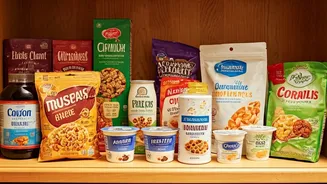Granola's Deceptive Charm
Granola often presents itself as the breakfast of champions, brimming with oats, nuts, and seeds. However, this seemingly wholesome mix can be a wolf in sheep's
clothing. Commercially produced granola is frequently loaded with added sugars, oils, and sometimes even chocolate chips or dried fruits. These additions dramatically increase the calorie count, often without providing significant nutritional benefits. Moreover, granola portions can be deceivingly large. People tend to pour a generous serving, which, combined with the dense calorie content, can easily lead to overconsumption. Therefore, while granola can offer some fiber and nutrients, be wary of the sugar and calorie bomb it can become, especially when not carefully monitored.
Yogurt's Flavorful Pitfalls
Flavored yogurt is another food item that often disguises its true nature. While plain yogurt is a good source of protein and calcium, its flavored counterparts frequently contain substantial amounts of added sugars and artificial sweeteners to enhance taste. The fruit on the bottom often contributes to this sugar overload, as it usually contains high-fructose corn syrup or cane sugar. These added sugars can lead to increased calorie intake and may contribute to weight gain. Furthermore, some flavored yogurts have reduced fat, which can be seen as an additional benefit. However, the fat is replaced with more sugar and additives to maintain the same mouthfeel, leading to the same negative effects on weight loss. It is therefore vital to read labels carefully and choose plain, unsweetened yogurt, adding your own fruits or natural sweeteners for a healthier option.
Dried Fruits: Sugar Bombs?
Dried fruits might seem like a healthy alternative to sugary snacks due to their concentrated source of fiber and vitamins. However, the process of drying fruits intensifies their natural sugar content. During drying, water is removed, concentrating the sugars and leading to a much higher calorie density per serving than fresh fruit. While dried fruits can be enjoyed in moderation, they can easily contribute to excess sugar and calorie intake if not consumed mindfully. Moreover, the added sugars and preservatives often found in commercial dried fruit can further exacerbate the issue. It's wise to be conscious of portion sizes and select varieties without added sugars or additives to avoid the unwanted weight gain they can cause.
Restaurant Salads: Hidden Dangers
Restaurant salads often appear to be a smart choice when eating out, but they can easily become calorie-laden meals. The perceived health benefit of the salad's greens can be overshadowed by high-calorie toppings, creamy dressings, and generous portions. Croutons, cheese, bacon bits, and other additions increase the overall calorie and fat content dramatically. Salad dressings, especially those with creamy textures, are often loaded with unhealthy fats, sugars, and sodium, further amplifying the detrimental effects. Therefore, when ordering a salad, it's crucial to be mindful of the ingredients. Ask for dressing on the side and opt for lighter options like vinaigrette. Pay attention to portion sizes and choose lean proteins and fresh vegetables over high-calorie toppings to make healthier decisions.
Nut Butters: Portion Control!
Nut butters, such as peanut butter and almond butter, are celebrated for their protein and healthy fats. However, their high-calorie density makes portion control essential. A couple of tablespoons of nut butter can contain a significant number of calories, making it easy to overconsume. Many commercial nut butters contain added sugars, salts, and oils, which undermine their health benefits. It is wise to choose nut butters that list only nuts as their ingredient. Also, it’s advisable to carefully measure each serving size to avoid excessive calorie intake. Combining nut butter with high-calorie additions, such as honey or added sugar, can transform a potentially healthy snack into one that could hinder your weight loss journey.
Smoothies: Sugar-Filled Secret?
Smoothies have become a popular way to consume a variety of fruits, vegetables, and other ingredients in a single serving. However, smoothies can quickly become calorie-dense and loaded with added sugars. The common practice of including excessive amounts of fruit, fruit juices, yogurt, and even sweeteners can lead to high sugar intake. Although smoothies can include healthy components such as spinach or kale, the added sugars and overall calorie count can easily outpace their nutritional benefits. When creating a smoothie, it is vital to balance fruits and vegetables, and limit the addition of sugary ingredients. Using protein powder, incorporating healthy fats, and watching portion sizes will allow you to enjoy smoothies in a way that contributes to, rather than sabotages, your weight loss efforts.
Protein Bars: Read Labels!
Protein bars are often marketed as convenient and healthy snacks, designed to support an active lifestyle. However, not all protein bars are created equal. Many protein bars can be loaded with added sugars, artificial sweeteners, and unhealthy fats to improve taste and texture. This compromises their health benefits and can contribute to weight gain if consumed frequently. Moreover, the marketing might mislead consumers into thinking these bars are always a superior choice, whereas, in reality, they might just be glorified candy bars. Before purchasing a protein bar, always check the nutrition label carefully. Look for options with moderate sugar content, a balance of protein and fiber, and avoid those with long lists of artificial ingredients. Consider homemade options for greater control over what goes into your snack.












